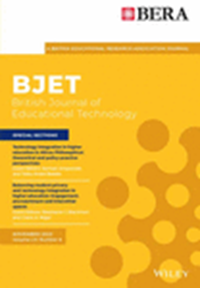Scaffolding middle school mathematics curricula with large language models
Abstract
Despite well-designed curriculum materials, teachers often face challenges implementing them due to diverse classroom needs. This paper investigates whether large language models (LLMs) can support middle school math teachers by helping create high-quality curriculum scaffolds, which we define as the adaptations and supplements teachers employ to ensure all students can access and engage with the curriculum. Through cognitive task analysis with expert teachers, we identify a three-stage process for curriculum scaffolding: observation, strategy formulation and implementation. We incorporate these insights into three LLM approaches to create warmup tasks that activate students' background knowledge. The best-performing approach provides the model with the original curriculum materials and an expert-informed prompt; this approach generates warmups that are rated significantly higher than those created by expert teachers in terms of alignment to learning objectives, accessibility to students working below grade level and teacher preference. This research demonstrates the potential of LLMs to support teachers in creating effective scaffolds and provides a methodology for developing artificial intelligence-driven educational tools.
Practitioner notes
What is already known about this topic
- Scaffolding is essential for enabling students to access and engage with curriculum materials.
- Large language models (LLMs) have shown promise in generating educational content and supporting teachers.
- Teachers frequently need to adapt and supplement standardized curricula to meet the diverse needs of their students.
What this paper adds
- Identifies a three-stage curriculum scaffolding process (observation, strategy formulation, implementation) used by expert teachers.
- Demonstrates that providing LLMs with additional context from the curriculum, such as the original warmup task, helps to ground the model and improve the quality of the generated warmup tasks.
- Demonstrates that, when prompted well, LLMs can generate warmup tasks that are of similar or better quality compared to those created by expert teachers in terms of alignment to learning objectives, accessibility and teacher preference.
Implications for practice and/or policy
- Provides practical suggestions for prompting LLMs to generate high-quality warmup tasks for middle school math teachers, such as incorporating additional curriculum context and expert-informed prompts.
- Demonstrates how cognitive task analysis with expert teachers can be used to develop LLM-based tools for educators that align with their practices and preferences.
- Indicates that additional research is needed to explore the potential for LLMs to support other types of curriculum adaptations, evaluate their effectiveness in classroom settings and investigate how they can be effectively tailored to the specific needs and characteristics of individual students.



 求助内容:
求助内容: 应助结果提醒方式:
应助结果提醒方式:


